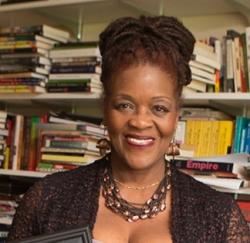
Zora Neale Hurston has an often discussed 1928 essay “How it Feels to be Colored Me” in which she made the argument which perhaps Kanye wanted to make.
“Someone is always at my elbow reminding me that I am the granddaughter of slaves. It fails to register depression with me. Slavery is sixty years in the past. The operation was successful and the patient is doing well, thank you. The terrible struggle that made me an American out of a potential slave said ‘On the line!’ The Reconstruction said ‘Get set!’ and the generation before said ‘Go!’ I am off to a flying start and I must not halt in the stretch to look behind and weep. Slavery is the price I paid for civilization, and the choice was not with me.”
However, that was 1928 and Hurston, though using the word “civilization” problematically, was really asserting that in spite of our setbacks and our history, we still have to move forward and achieve as she was prepared to do. This is very different from a young man in 2018, ninety years later saying that enduring four hundred years of slavery was a choice. I recently heard as well some First People describing 524 years of violence under European settler colonialism. Can anyone say that they chose a genocide as part of their history? So “choice” may be an individualistic “free will” kind of framework but difficult when applied to an entire race, nation, population. There are many cases of individuals and groups who “chose” to leave, rebel, fight back, sometimes acquiesce in order to live another day.
Documentations of resistance but also of punishments meted out to people who dared exercise “choice” not to stay enslaved are available. Dismemberment was one of these punishments. The Black Book (1974) which was one of Toni Morrison’s contributions when she was at Random House is a good place to begin, as it is an accessible compendium of material on and by the enslaved. A more recent contribution, If We Must Die (2009) documents over five-hundred shipboard rebellions. The documenting of the brutality of plantation slavery was indeed one of the functions of “slave narratives,” basic reading in many university courses. These narratives also documented how people resisted. The famous Narrative by Frederick Douglass (1848) or Linda Brent, Incidents in the Life of a Slave Girl (1868) are examples. Indeed a whole genre of “slave narratives/freedom narratives” and abolitionist work provides the information that Kanye needs to engage for an informed presentation of his ideas.
For those like Kanye who are clearly not reading, it may be easy to assume that there was no resistance. Perhaps the story of this resistance is often not told substantially enough. In describing this issue before, in a review of the film version of “Twelve Years a Slave,” I began by asserting that according to legendary historian of the African-American experience, John Hope Franklin, Runaway Slaves. Rebels on the Plantation (OUP, 1999), the resistance text in black histories of enslavement tends to be the one erased in favor of the text of control, abuse and endless and perpetual degradation and domination. African American, Caribbean, Latin American and Brazilian historians have been meticulous in documenting the history of slavery, the nature of violence of the plantation and on black bodies in general, but also the continued resistance. Indeed while it is not easy to organize an entire population to fight back against slavery, the Haitian Revolution is the best example of an entire people taking back their freedom and becoming a nation, but enduring years of isolation for daring to do so. In addition, there are several documented slave rebellions and maroon communities all across the Americas. The Underground Railroad ran in many directions, and markers, which document safe house, indicate flights from slavery not just North, but also West and further South i.e. from Florida to the Caribbean. Marcus Garvey’s “Emancipate yourself from mental slavery; none but ourselves can free our minds” as he organized the largest mass movement of working class black people in history then put to song by Bob Marley applies to all of us including Kanye; definitely not individual choice but coming to consciousness through knowledge.
One can understand the frustration of a Kanye West seeing no change in the Chicago of his childhood, even after having a black politician from Chicago – Barack Obama — become president. Perhaps the critique of Obama has been silenced in favor of a celebratory narrative, especially under the current presidential paradigm. But such a critique cannot come at the expense of denigrating all black people, which Kanye does by suggesting in his language of “choice” that our people chose brutality and enslavement for 400 years without resisting. Clearly Obama in 8 years could not undo that same 400 years of degradation and its results. So the critique has to be of the oppressor and his monopoly of violence for economic profit.
My advice to Kanye: Read! Maybe finish your degree even doing online study widely available now. Donate to African American Studies Departments often struggling with meager resources; name a fellowship or named professorship after your mother at one of the Chicago universities; help advance curricula that teach the African American experience to children instead of the narrative of complicity in our own brutality; use the platform that you have to educate with factual information that allows for transcendence.
A short excerpt of this text appeared in Newsweek.

who is currently professor of Africana Studies and English at Cornell University. In 2017, she received The Franz Fanon Lifetime Achievement Award from the Caribbean Philosophical Association and the Distinguished Africanist Award from the New York State African Studies Association. She has held distinguished professorships at a number of Universities and is the author or editor of thirteen (13) books most recently Caribbean Spaces (2013) and the 3-volume Encyclopedia of the African Diaspora She serves on the International Scientific Committee of UNESCO General History of Africa, Volume 9. She has lectured on Black Women’s Writings and Experience, Black Left Feminism, African Diaspora issues, at major colleges and universities in Brazil, Europe, Africa, the Caribbean, Australia, India and China. She has held visiting professorships at University of Brasilia, Brazil, Beijing Foreign Studies University, University of the West Indies, St. Augustine. As Director of African New World Studies at Florida International University, she developed the Florida Africana Studies Consortium and served on the Commissioner of Education’s Task Force for Implementing the Florida Mandate for the Teaching of African American experience. She has been president of major academic organizations such as the African Literature Association and Caribbean Studies Association.







